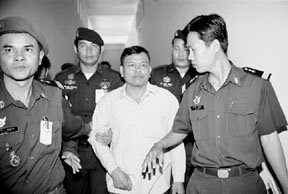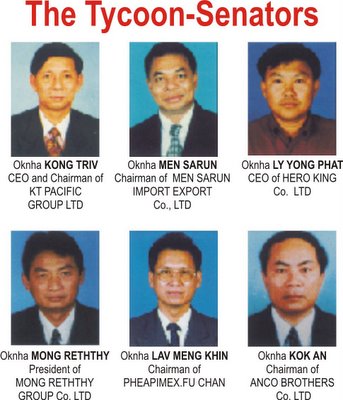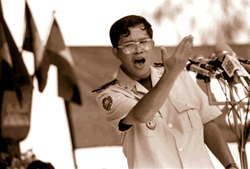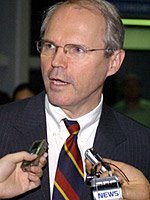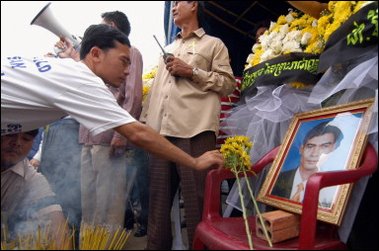By GEOFFREY YORK
Saturday, January 28, 2006 Posted at 3:16 AM EST
Globe and Mail Update (Canada)
Phnom Penh — For 12 days and 12 nights, the Khmer Rouge tortured Chum Mey with horrific brutality. They clubbed him with sticks, broke his fingers, pulled out his toenails with pliers and knocked him unconscious with electric shocks.
He was a sewing-machine repairman who could not understand why the Khmer Rouge had arrested him. He had no idea what awaited him in the anonymous-looking former school building in Phnom Penh — until he saw the blood on the floor of his cell. It was the notorious S-21 torture prison.
His interrogators ordered him to confess that he was an agent of the CIA and the KGB — even though he had never heard of either organization. To stop the torture, he confessed to everything they wanted. He narrowly escaped being sent to the killing fields, where an estimated 16,000 prisoners from S-21 were slaughtered. And then, as the Khmer Rouge retreated to the jungle, they shot and killed his wife and daughter.
Mr. Mey, one of the few survivors of S-21, has waited patiently for justice for more than 27 years. But next month, the United Nations will send officials to Cambodia to help prepare trials for the masterminds of the killing fields. The trials are likely to begin this year, with former Khmer Rouge leaders facing possible genocide charges for killing an estimated 1.7 million people from 1975 to 1979.
The 75-year-old survivor still cannot quite believe that the trials will finally happen. “Is it true?” he keeps asking a visiting journalist.
“If a trial happens, I'll be happy,” he says. “But I still think it might not happen. I've been waiting a long time for this trial. They've talked about it many times, but it never seemed to happen.”
Only 14 people are believed to have survived the torture cells of S-21. Of that tiny group, almost all are now dead. Mr. Mey is one of only three who are still alive. Today, he lives a meagre existence with his six children in a small house in Phnom Penh. “Life is hard,” he says. “If I don't go to work, I don't have money to live.”
What hurts him most today is the disbelief that he hears from younger Cambodians who were born after Pol Pot's regime was toppled. In his own neighbourhood, young people are unaware of the Khmer Rouge and its reign of terror.
“We don't believe it,” they tell him. “We've never seen any Khmer Rouge. What is the Khmer Rouge?”
He doesn't want the trials as a form of vengeance. He wants a trial that will educate Cambodians about the almost indescribable reality of what happened.
“I want this for my children and grandchildren. I want to prove to them that S-21 was a real prison, not just a myth. I want this to be in school textbooks. I want to go to a trial and see and hear what happened. I want to know why the Khmer Rouge did this to me.”
At the back of his mind is a lingering fear. “I'm afraid that someone in the Khmer Rouge — maybe someone who worked at S-21 — could try to kill me to eliminate the evidence.”
By some measures, the genocide in Cambodia was the worst in human history. Never before has a regime slaughtered one-quarter of its own population. Pol Pot and his Maoist zealots proclaimed a return to “Year Zero.” Intellectuals were eliminated, religion was destroyed, currency was abolished, the country was cut off from the outside world and city dwellers were force marched into the countryside to be slave labourers in the fields, where countless numbers died of starvation and overwork.
The trials, too, could make history. Other trials for crimes against humanity — including the current trials for war crimes in Rwanda and the former Yugoslavia — have been held in foreign countries, far from the view of the survivors. The Khmer Rouge trials will be one of the first UN-backed trials to be held within the country where the genocide occurred. Victims and survivors will be able to travel to the courtroom — in a former military compound on the outskirts of Phnom Penh — to watch the proceedings and to see justice being done.
“This is extremely important,” said Alexander Hinton, a U.S. scholar who has written extensively on the Khmer Rouge. “I hope it will become a precedent. In Rwanda, people in the countryside have no clue that a trial is even taking place.”
But while the global precedents are significant, the meaning for ordinary Cambodians is much greater. Virtually everyone in Cambodia had family members killed in the Khmer Rouge period. Even 30 years later, the emotions are still raw, and many people are still searching for relatives who disappeared.
The latest journal of the Documentation Centre of Cambodia, which compiles testimony on Khmer Rouge atrocities, contains two pages of heart-wrenching stories from Cambodians who are still trying to find family members who disappeared.
Just last month, a 62-year-old woman from a small village made a 100-kilometre trek to Phnom Penh to visit the documentation centre. She clutched a ragged and faded photograph of her husband, who disappeared during the Khmer Rouge period after he was conscripted into the army.
The woman, an illiterate farmer, had worked as a maid for her neighbour for a week to raise the $5 that she needed for transportation to the city. She knows her husband is almost certainly dead. She merely hopes to find the date of his death, so that she knows what day to pray for him at a Buddhist temple.
“It broke my heart,” said Youk Chhang, director of the documentation centre. “She spoke in such a calm and peaceful way. She is free now, because she knows that we will do the searching for her.”
Mr. Chhang is himself a survivor of Khmer Rouge brutality. In 1977, at the age of 14, he was savagely beaten and jailed for picking vegetables from a field to feed his pregnant sister. His mother witnessed the beating, which left him bleeding from wounds by axes and knives, but she did not dare to intervene.
“To see my mother walk away while I was being tortured — I would rather have died,” he says. “I couldn't understand it until many years later. Now I know that she couldn't help me because it would have been considered a crime.”
Even after many years of negotiations and delays, there is still widespread controversy over the Khmer Rouge trials. Some human-rights groups are unhappy at the compromise agreement between Cambodia and the UN, which requires a majority of the trial judges to be Cambodian. The Cambodian justice system is notoriously weak and politically manipulated, and there are fears that the integrity of the trials could be jeopardized by the Cambodian majority.
But proponents argue that the compromise was necessary to ensure that the trials had the Cambodian government's support and would be held within Cambodia's borders, not in a foreign country.
Until recently, Khmer Rouge sympathizers were still an influential force in Cambodia. They remained an active guerrilla army until the 1990s. Even the Cambodian Prime Minister, Hun Sen, is a former Khmer Rouge regimental commander. He opted to strike deals with the Khmer Rouge in the 1990s to persuade them to abandon their war against the government.
“A lot of people say that the trials will be flawed, but we have to make the most of it,” Mr. Chhang says. “A trial cannot bring back what we lost, or bring perfect justice, but it will help the survivors come to terms with it and move on. For the survivors, seeing and hearing a trial is a form of justice. Emotionally, this is very significant. We are closing a dark chapter of world history.”
This month, the former military compound near Phnom Penh was formally handed over to the UN-backed tribunal as the headquarters for the trials. The UN is now finalizing its list of judges and prosecutors, which have to be approved by the Cambodian government. Its researchers have already begun their work.
Canadians will be among those involved in the trials. A Canadian, Peter Foster, has been appointed spokesman for the UN side of the trials, and a retired Quebec Court of Appeal judge, Michael Proulx, has been short-listed as a possible judge in the pre-trial chamber that will settle any disagreements among the Cambodian and UN prosecutors and investigating judges. Canada also contributed $1.7-million toward the $56-million (U.S.) cost of the trials.
When the prosecutors begin their work, they must decide which Khmer Rouge leaders to prosecute and what charges to impose. Genocide and crimes against humanity are among the possible charges. The court proceedings are expected to begin in late 2006 and will probably continue for at least a year.
Critics had often predicted that the trials would be delayed until the elderly former Khmer Rouge leaders have peacefully died. Their skepticism seemed justified when the negotiations between the UN and Cambodia dragged on for six years, followed by two more years of financial wrangling after the agreement was reached.
“It was a time-consuming process, but now we see the light at the end of the tunnel,” said Sean Visoth, the chief Cambodian administrator for the trials. “Given the urgency of the issue and the old age of these people, we must have this trial as soon as possible.”
He argues that the trials, with their UN support and expertise, will help to strengthen Cambodia's justice system. But more ambitious goals are even more crucial. “We want to prevent these crimes from ever taking place again,” he says.
“We want to know the truth — why was there such killing? Our motto is ‘never again' — the same as it was after Nazi Germany. We have to send a strong message to leaders that they cannot get away with these crimes. They will be brought to justice, no matter how long it takes.”









